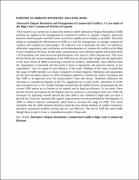| dc.contributor.author | bareebe, Ngabirano ROsemary | |
| dc.date.accessioned | 2018-11-05T07:28:16Z | |
| dc.date.available | 2018-11-05T07:28:16Z | |
| dc.date.issued | 2014 | |
| dc.identifier.citation | bareebe, N. R. (2014). Alternative Dispute Resolution and Management of Commercial Conflicts: A Case Study of the High Court Commercial Division of Uganda. Uganda Martyrs University, Nkozi: Uganda Martyrs University. | en_US |
| dc.identifier.uri | http://hdl.handle.net/20.500.12280/943 | |
| dc.description.abstract | BAREEBE NGABIRANO ROSEMARY (2014-M102-20106)
Alternative Dispute Resolution and Management of Commercial Conflicts: A Case Study of the High Court Commercial Division of Uganda.
This research was carried out to assess the extent to which Alternative Dispute Resolution (ADR) methods are applied in the management of commercial conflicts in Uganda. Litigants, especially business minded people want their issues resolved as rapidly and as cheaply as possible. This study aimed at evaluating the effectiveness of ADR as a tool for management, to manage commercial conflicts and commercial relationships. The objective was to determine the effect of mediation, arbitration, negotiation, and conciliation on the determination of commercial conflicts at the High Court Commercial Division. In this study, questionnaires were utilised to gather information from 110 respondents and semi-structured questionnaires were used to collect perspectives. The study briefly details the various techniques of the ADR process and provides insight into the application of the select forms of ADR in resolving commercial conflicts. Additionally, data collected from the respondents is presented and discussed in form of quotations and narrative themes as per respondents‟ views in regard to each objective of the study. Findings of this study revealed that the usage of ADR methods was lesser compared to formal litigation. Mediation and negotiation are the most prevalent choices of ADR techniques applied to commercial conflict resolution and that ADR as an approach saves the businessman‟s time and money. Mediation influences the outcomes in commercial disputes at 60.3 %, negotiation by at least 43.2%, arbitration at 23.9% and conciliation by 12.5%. Further findings revealed that the ineffectiveness incorporated into the current ADR system act as barriers to its optimal use by legal practitioners. To an extent, these barriers include: perceptions by the litigants who are unaware or unwilling to enter into ADR, the resistance by opposing counsel and the fact that ADR is not confined to legal rules nor does it provide for corrective measures like appeal. Improvements are recommended for development of ADR to achieve effective settlements which lead to increase the usage of ADR. This study concludes that the ADR methods introduce relatively less formal methods of conflict resolution; introduce consensual problem solving and are cost effective. The use of ADR has taken hold, though there is need to have a comprehensive policy framework.
Key Words: Alternative Dispute Resolution, Commercial Conflicts High Court Commercial Division. | en_US |
| dc.language.iso | en | en_US |
| dc.publisher | Uganda Martyrs University | en_US |
| dc.subject | Alternative Dispute Resolution | en_US |
| dc.subject | Commercial Conflicts | en_US |
| dc.subject | High Court Commercial Division | en_US |
| dc.title | Alternative Dispute Resolution and Management of Commercial Conflicts: A Case Study of the High Court Commercial Division of Uganda. | en_US |
| dc.type | Thesis | en_US |


